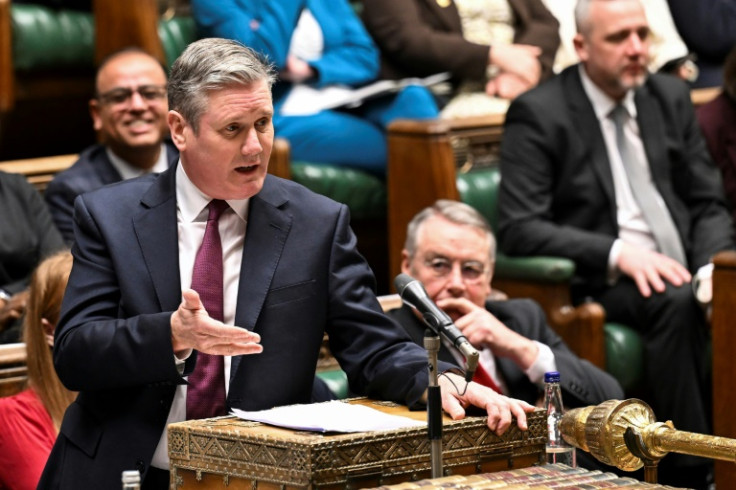UK's Labour Vows Action As Anti-Semitism Scandal Reemerges
Britain's main Labour opposition vowed Wednesday to block candidates deemed unfit to be lawmakers, as the party expected to form the next government grappled to quell a fresh anti-Semitism row.

Britain's main Labour opposition vowed Wednesday to block candidates deemed unfit to be lawmakers, as the party expected to form the next government grappled to quell a fresh anti-Semitism row.
Out of power since 2010 but tipped to win a general election due this year, Labour has for years been fighting to shake off allegations of anti-Semitism within its ranks.
But experts say the suspension of two prospective MPs this week for comments about Israel shows the party still has work to do, and highlights its divisions over the war in Gaza.
Ex-Labour lawmaker Graham Jones, its candidate in a northwest English seat at the next election, was suspended Tuesday after audio emerged of him using the words "fucking Israel" during a meeting.
He also allegedly suggested British people who volunteer to fight with the Israeli Defence Forces should be "locked up". The comments came in an audio recording of a regional Labour party meeting.
Jones's suspension came a day after the party withdrew support for another of its candidates, Azhar Ali, standing in a February 29 by-election in Rochdale, northwest England.
In a recording obtained by the Daily Mail from the same event Jones attended, Ali suggested Israel deliberately allowed Hamas's October 7 attack to justify invading Gaza.
The party initially stood by his candidacy after he apologised, but then decided it could no longer back him after other comments came to light.
In the same recording, he allegedly blamed "people in the media from certain Jewish quarters" for last year's suspension of another Labour MP over comments about Israel.
Labour's defence spokesman John Healey defended the party's handling of the incidents.
"The party will act, and (leader) Kier Starmer will act, swiftly and decisively to make sure that our candidates and our MPs meet the very highest standards," he told Sky News.
"This is not a party or people who are saints," he added, insisting what mattered was how the party responded to wrongdoing allegations.
Healy told BBC radio in a separate interview that "we will act to block those who are not fit to serve as MPs".
Mike Katz, chair of the Jewish Labour Movement, said party leaders had to "redouble" efforts against anti-Semitism, but dismissed as "ludicrous" claims that Labour had failed to reform.
Labour was plagued by accusations of anti-Semitism within its ranks under the 2015-2020 leadership tenure of leftist Jeremy Corbyn.
A landmark October 2020 report by the Equality and Human Rights Commission ruled that Labour under Corbyn had broken the law in its "inexcusable" handling of complaints.
The period saw Jewish members and lawmakers leave the party in droves as criticism of Israel and Zionism veered into toxic anti-Semitism.
However, the UK equalities watchdog last year removed Labour from two years of special supervision over the issue.
Starmer, in charge of the party for nearly four years since, has made tackling the issue a key mission.
"Overall, the party has made genuine progress," Tim Bale, politics professor at Queen Mary University of London, told AFP.
"But this is a wake-up call that it still has some way to go in completing the task."
The furore came as a survey by the polling firm Savanta showed Labour's lead over the Conservatives dropping by seven points from two weeks ago.
Director Chris Hopkins cautioned against reading too much into the poll but said it "serves as useful a reminder as any that Labour's lead - while consistently high for many months -- is not infallible".
Sophie Stowers, a British politics researcher at the UK in a Changing Europe think-tank, said the anti-Semitism row could risk inflaming voters' concerns about Starmer's hesitancy in calling for a ceasefire between Israel and Hamas.
It is unlikely to make big difference at national level, she said, but could impact seats with a large number of Muslim voters, such as Rochdale.
"(T)he risk is not just that voters are driven to other parties, but to alternate fringe candidates which can split the vote and leave Labour vulnerable," she told AFP.
© Copyright AFP 2025. All rights reserved.




















